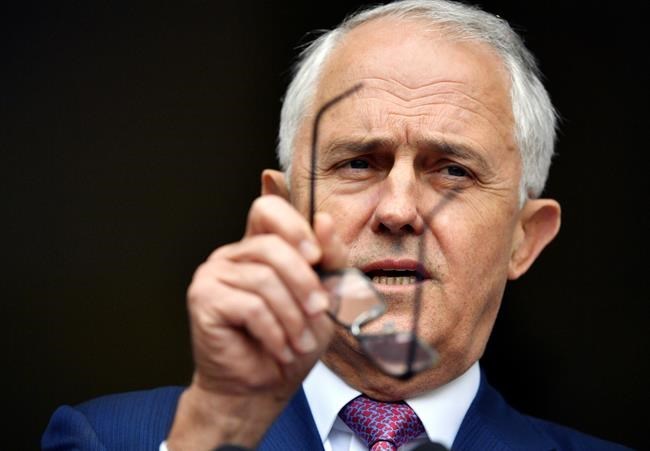
Australia's Prime Minister Malcolm Turnbull attends a press conference at Parliament House in Canberra, Tuesday, Dec. 5, 2017. Australia will ban foreign interference in its politics, motivated largely by Russia’s alleged involvement in last year’s U.S. election and China’s growing influence on world politics. (Mick Tsikas/AAP Image via AP)
Republished December 05, 2017 - 6:21 AM
Original Publication Date December 04, 2017 - 9:16 PM
SYDNEY, Australia - Australia will ban foreign interference in its politics — either through espionage or financial donations — in a move motivated largely by Russia's alleged involvement in last year's U.S. election and China's growing influence on the global political landscape.
Prime Minister Malcolm Turnbull said Tuesday that foreign interference in politics would be outlawed under updated treason and espionage laws. The announcement comes as a U.S. investigation into alleged election meddling by Russia continues, and follows Obama administration concerns about Chinese money and influence in Australian politics.
"Foreign powers are making unprecedented and increasingly sophisticated attempts to influence the political process, both here and abroad," Turnbull told reporters in Canberra, Australia's capital.
Under the new laws, it will be a crime for a person to engage in conduct on behalf of a foreign principal that will influence a political or governmental process, including opposition party policy, and is either covert or involves deception.
The foreign influence and interference package will be complemented by another bill on electoral reform that will ban foreign political donations, Turnbull said.
"We must ensure that our politics and our Parliament are strong enough to withstand attempts by foreign powers to interfere or influence," he added in a statement.
The laws would criminalize acts such as Labor Party Sen. Sam Dastyari's soliciting of a donation from a Chinese businessman, which got Dastyari demoted to the opposition backbench last week.
Dastyari has been dubbed "Shanghai Sam" for his dealings with Chinese Communist Party-linked businessman Huang Xiangmo. This included asking for a Huang-owned company to pay a $1,250 travel bill and giving Huang counter-surveillance advice — saying he and Huang should leave their cellphones inside Huang's house during a meeting last year while walking and talking outside.
Attorney General George Brandis said the fact that Dastyari's conduct had not breached any laws showed a need for a review.
"That is why we are introducing, because of the gap in those laws, a new offence of unlawful foreign interference," Brandis told reporters.
Under the new laws, the offence of espionage will cover not only the passing on of information, but possessing and receiving it as well.
There will also be a new offence that will criminalize soliciting or procuring a person to engage in espionage, and a new "preparation and planning" offence.
Espionage will carry a penalty of up to life in prison.
Turnbull said the reforms would "reshape the way our national security agencies investigate and disrupt" foreign interference and espionage and would protect the Australian way of life.
"They will strengthen our democracy and will ensure that decisions are made based on Australia's national interest, not anyone else's," he said in a statement.
The reforms follow a recommendation from an Australian parliamentary committee last March for a ban on political donations from foreign companies and individuals.
Unlike the U.S. and many other countries that ban foreign donations, Australian law has never distinguished between donors from Australia and overseas.
Former President Obama's administration last year called for the Australian system to be reformed to remove the influence of political donations from China — Australia's largest trading partner and its biggest source of foreign political funds.
The then-U.S. Ambassador John Berry said the U.S. was surprised by the amount of Chinese money and influence in Australian politics and wanted Australia to resolve its foreign donation issue.
News from © The Associated Press, 2017